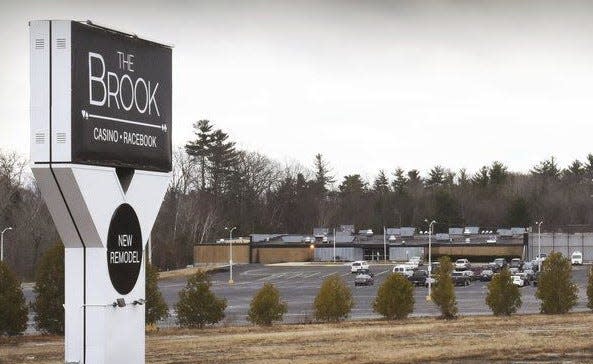The Brook casino rolls dice on housing complex project with NH Housing Appeals Board
SEABROOK — The fate of The Brook casino's proposed 223-unit housing complex off Route 107 may lie in the hands of the state’s relatively new Housing Appeals Board.
Enacted in July 2020 through RSA 679, the Housing Appeals Board is a three-member panel appointed by the state’s Supreme Court that hears appeals of decisions made by municipal boards, committees, and commissions on land use issues related to housing.

The Brook has filed an appeal to the Housing Appeals Board in the aftermath of Seabrook's Zoning Board rejecting variances for the proposed development.
Although appealing local board decisions to the Superior Court is still an option, with a flat fee of $250 and strict timeframes for application, hearings and decision-making, the Housing Appeals Board can be a less expensive and more time-efficient option than getting tied up in court.
'We're still in shock': How a Newmarket family won big at The Brook Casino in Seabrook
What led to The Brook’s appeal to state board
Nevada-based RMH NH, a company linked to The Brook operator Eureka Casinos, first presented its housing development proposal to the Seabrook Zoning Board in 2022. At the time, The Brook CEO Andre Carrier sought multiple variances to build 334 housing units on 75 acres on the southwest corner of Brook Casino, off Route 107.
One of its major local hurdles is the land in question spans two town zones: the rural zone (Zone 1), and the industrial zone (Zone 3), neither of which permits multi-unit housing complexes. There are also town building height and wetlands issues that required variances.
The Zoning Board first denied variances in 2022, after which Carrier appealed the case to the new Housing Appeals Board, according to Seabrook ZBA Chairman Jeffrey Brown. But the case “was put on hold,” Brown said, while Carrier reworked his proposal.

In September 2023, Carrier offered the ZBA a new smaller 223-unit proposal, however, it required similar variances. The new proposal consisted of 34 two-bedroom, freestanding duplexes, 119 units in a four-story building (43 one-bedroom and 76 two-bedroom apartments), and 81 senior housing units in a multi-story building for those aged 55 years or older. The complex was not “affordable or section 8 housing," Carrier said, but did include 20 units designated as “workforce housing,” though the remaining units were to rent at “market rate.”
At that time, the ZBA again denied the required variances needed.
This month, according to Housing Appeals Board’s Clerk Elizabeth Menard, the Housing Appeals Board granted Carrier’s motion to lift the stay of appeal on Jan. 12. That motion also required the town to file its “certified record of pertinent ZBA proceedings with the Housing Appeals Board within 30 days of the date of the order.”
Menard wrote the board will “likely schedule a prehearing conference and hearing on the merits of appeal shortly after receiving the town’s record and answer filings.” Public notice of hearing dates for the case will be posted on www.hab.nh.gov, the Housing Appeal Board’s website, she stated.
Brown believes hearings will be similar to those before the Superior Court, with both sides presenting their cases before the Housing Appeals Board, which will render a decision. Brown said that decisions of the board are still up to further appeal to the New Hampshire Supreme Court.
More: NextEra seeks NRC approval to change Seabrook nuclear plant's emergency plans
What is the Housing Appeals Board?
Established on July 1, 2020, according to statute, the three-member board of the Housing Appeals Board is appointed by the state Supreme Court, and must consist of those “learned and experienced in questions of land use law, or housing development.” Included among the three must be one state-licensed attorney and either a professional engineer or land surveyor.
The three board members are full-time and salaried and serve for five years, according to state statute. Members may not take part in other employment or duties that may conflict with their roles on the Housing Appeals Board.
According to the statute, the Housing Appeals Board has the authority to “hear and affirm, reverse, or modify, in whole or in part, appeals of final decisions,” made by local boards, committees, or commissions on issues regarding housing developments. Although commercial developments are not within the board’s purview, it can hear appeals related to mixed-use complexes or those including both housing and commercial uses.
The board hears cases primarily filed by applicants rejected by local entities like boards such as zoning, planning, historic or conservation, etc. But it can also accept those filed by non-applicants – such as abutters – by granting “intervenor status” if “legal standing” can be demonstrated.
The timing requirement within the statute is one reason why appealing before the Housing Appeals Board may be more expedient than filing with the Superior Court. For example, an applicant must file an appeal with the board within 30 days of the final decision of a municipal board, notifying the local entity within the same time frame.
The municipal board has 30 days from notice to submit certified records of the related proceedings.
The Housing Appeals Board must hold a hearing within 90 days of receipt of the notice of appeal, and the board must decide on the appeal within 60 days of conducting the hearing.
Hampton development 2024: Casino makeover, downtown apartments, senior housing and more
Filing an appeal with the Housing Appeals Board negates the party from filing an appeal in the Superior Court unless the board determines it does not have jurisdiction on the topic. Decisions by the board are subject to appeal to the New Hampshire Supreme Court.
According to Menard, after its creation on July 1, 2020, the board formed and began accepting appeals in January 2021. Since then, according to Menard, 98 appeals have been filed as of Jan. 22, 2024. Only 12 decisions have been appealed to the Supreme Court, at this time, according to Menard.
Menard said the board does not publish the number of times it reverses the decision of local agencies.
However, according to an April 2022 article in the Concord Monitor, as of that time, the Housing Appeals Board had vacated or remanded back to local boards, “about three decisions for every one that it upholds. Virtually all of its cases involve proposals that had been rejected.”
This article originally appeared on Portsmouth Herald: The Brook’s casino-backed housing in Seabrook appealed to NH board
